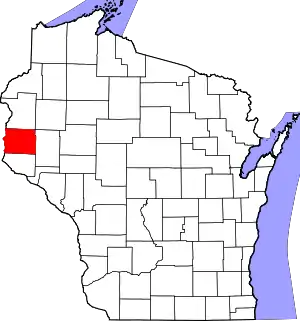River Falls, Wisconsin
River Falls is a city in Pierce and St. Croix counties in the U.S. state of Wisconsin. It is adjacent to the Town of River Falls in Pierce County and the Town of Kinnickinnic in St. Croix County. River Falls is the most populous city in Pierce County. The population was 15,000 at the 2010 census, with 11,851 residing in Pierce County and 3,149 in St. Croix County. It is part of the Minneapolis-St. Paul metropolitan area and located approximately 30 miles (48 km) east of the center of that region.[5]
River Falls, Wisconsin | |
|---|---|
City | |
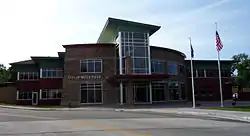 River Falls City Hall[1] | |
 Location of River Falls in Pierce County and St. Croix County, Wisconsin. | |
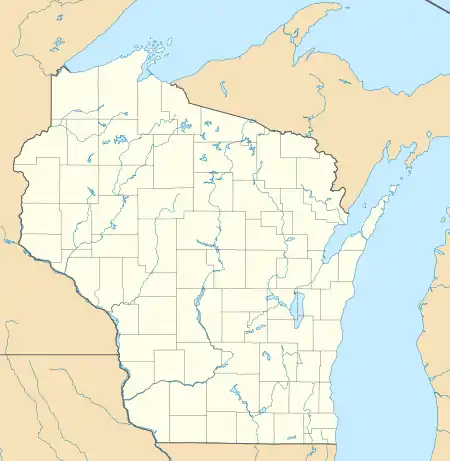 River Falls, Wisconsin Location within the state of Wisconsin | |
| Coordinates: 44°51′31″N 92°37′30″W | |
| Country | |
| State | |
| County | Pierce and St. Croix |
| Government | |
| • Type | Mayor – Council |
| • Mayor | Dan Toland |
| Area | |
| • Total | 7.27 sq mi (18.83 km2) |
| • Land | 7.19 sq mi (18.61 km2) |
| • Water | 0.08 sq mi (0.21 km2) |
| Population | |
| • Total | 15,000 |
| • Estimate (2019)[4] | 16,027 |
| • Density | 2,230.00/sq mi (861.05/km2) |
| Time zone | UTC−6 (Central (CST)) |
| • Summer (DST) | UTC−5 (CDT) |
| Area code(s) | 715 & 534 |
| FIPS code | 55-68275 |
| Website | http://www.rfcity.org |
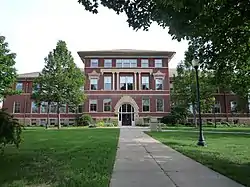
River Falls is the home of the University of Wisconsin–River Falls.
History
The city's first settlers were Joel Foster and his indentured servant, Dick, in 1848.[6] The village was started as Kinnickinnic in 1854 by brothers Nathaniel N. and Oliver S. Powell, who were from St. Lawrence County, New York. At the time, the town and village were also known as Greenwood, but this was changed, as another Greenwood, Wisconsin already existed.[7] The present name comes from the Kinnickinnic River rapids.[8]
On June 23, 1893, a lightning bolt hit the center circus pole at a Ringling Brothers circus performance in River Falls, injuring more than a dozen audience members and performers and killing seven.[9]
Geography
River Falls is located at 44°51′31″N 92°37′30″W (44.858701, −92.625097).[10]
According to the United States Census Bureau, the city has a total area of 6.60 square miles (17.09 km2), of which 6.52 square miles (16.89 km2) is land and 0.08 square miles (0.21 km2) is water.[11]
River Falls lies on the banks of the Kinnickinnic River, a class one trout stream. The South Fork of the Kinnickinnic River runs through the city, dividing the University of Wisconsin-River Falls campus into two sections.
Demographics
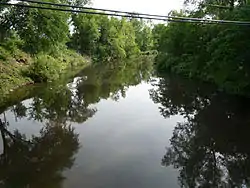
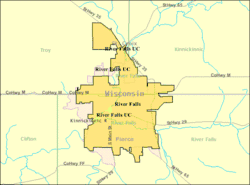
| Historical population | |||
|---|---|---|---|
| Census | Pop. | %± | |
| 1860 | 272 | — | |
| 1870 | 741 | 172.4% | |
| 1880 | 1,499 | 102.3% | |
| 1890 | 1,783 | 18.9% | |
| 1900 | 2,008 | 12.6% | |
| 1910 | 1,991 | −0.8% | |
| 1920 | 2,273 | 14.2% | |
| 1930 | 2,363 | 4.0% | |
| 1940 | 2,806 | 18.7% | |
| 1950 | 3,877 | 38.2% | |
| 1960 | 4,857 | 25.3% | |
| 1970 | 7,238 | 49.0% | |
| 1980 | 9,019 | 24.6% | |
| 1990 | 10,610 | 17.6% | |
| 2000 | 12,560 | 18.4% | |
| 2010 | 15,000 | 19.4% | |
| 2019 (est.) | 16,027 | [4] | 6.8% |
| U.S. Decennial Census[12] | |||
2000 census
At the 2000 census there were 12,560 people, 4,269 households, and 2,335 families living in the city. The population density was 2,524.0 people per square mile (973.8/km2). There were 4,346 housing units at an average density of 873.2 per square mile (336.9/km2). The racial makeup of the city was 96.57% White, 0.53% Black or African American, 0.36% Native American, 1.02% Asian, 0.09% Pacific Islander, 0.32% from other races, and 1.12% from two or more races. Hispanic or Latino of any race were 0.95%.[13]
Of the 4,269 households 29.1% had children under the age of 18 living with them, 42.7% were married couples living together, 9.1% had a female householder with no husband present, and 45.3% were non-families. 27.7% of households were one person and 9.1% were one person aged 65 or older. The average household size was 2.44 and the average family size was 2.98.
The age distribution was 17.9% under the age of 18, 35.1% from 18 to 24, 23.8% from 25 to 44, 14.6% from 45 to 64, and 8.6% 65 or older. The median age was 24 years. For every 100 females, there were 83.5 males. For every 100 females age 18 and over, there were 80.1 males.
The median household income was $41,184 and the median family income was $60,253. Males had a median income of $36,275 versus $27,345 for females. The per capita income for the city was $17,667. About 4.4% of families and 14.9% of the population were below the poverty line, including 6.6% of those under age 18 and 11.1% of those age 65 or over.
2010 census
At the 2010 census there were 15,000 people, 5,150 households, and 2,812 families living in the city. The population density was 2,300.6 inhabitants per square mile (888.3/km2). There were 5,449 housing units at an average density of 835.7 per square mile (322.7/km2). The racial makeup of the city was 94.8% White, 1.2% African American, 0.4% Native American, 1.5% Asian, 0.5% from other races, and 1.6% from two or more races. Hispanic or Latino of any race were 1.8%.[3]
Of the 5,150 households 28.2% had children under the age of 18 living with them, 40.6% were married couples living together, 9.9% had a female householder with no husband present, 4.1% had a male householder with no wife present, and 45.4% were non-families. 27.1% of households were one person and 8.4% were one person aged 65 or older. The average household size was 2.42 and the average family size was 2.89.
The median age was 24.2 years. 17.2% of residents were under the age of 18; 34.5% were between the ages of 18 and 24; 23% were from 25 to 44; 17% were from 45 to 64; and 8.2% were 65 or older. The gender makeup of the city was 46.8% male and 53.2% female.
Education
School District of River Falls operates public schools. River Falls High School is the district's public high school. Meyer Middle School acts as the district's middle school. There are also 5 public elementary schools in the school district.[14]
River Falls is home to the University of Wisconsin-River Falls and a branch of the Chippewa Valley Technical College.
Recreation
The Kinnickinnic River, which flows through the heart of the city and its downtown business district, is a popular recreational attraction in River Falls for fly fishers and kayakers.
On the bluffs of the Kinnickinnic River is Glen Park, a 41-acre park established in 1898. The park has playgrounds, a swimming pool, soccer fields, a softball diamond, basketball courts, horseshoe pits, a gazebo, and several miles of walking trails.[15] The Glen Park Pool was built in 1937 and renovated for its 75th anniversary in 2012.[16] Glen Park's Swinging Bridge offers a view of the South Fork rapids as it enters the Kinnickinnic River. The bridge, a replica of one designed by the Minneapolis Bridge Company and constructed in 1925, is a suspension bridge that spans the South Fork Rapids at the site of the former Cascade Mill and Dam. Below the bridge are fishing, swimming, and picnic spots.[17]
Hoffman Park, located northeast of downtown River Falls, is a 53-acre (21 ha) facility that contains baseball fields, a nine-hole disc golf course, a campsite, a skate park, volleyball courts, and the Tri-Angels Playground.[18] The playground was named after Amara, Sophie, and Cecilia Schaffhausen, who were murdered by their father, Aaron Schaffhausen. The playground, accessible to handicapped children and built with designs referring to the three girls, opened in 2015.[19] It was constructed at a cost of $550,000 by volunteers.[20]
Another attraction is The Falls Theater, a movie theater.
Notable people
- Aldrich Hazen Ames, C.I.A. counter-intelligence officer and analyst; convicted in 1994 of spying for the Soviet Union and Russia
- Abraham D. Andrews, Wisconsin State Senate
- Lynn H. Ashley, Wisconsin State Assembly
- Jule Berndt, Wisconsin State Assembly
- William Berndt, Wisconsin State Senate
- Kevin Black, All American Wrestler and Olympic Coach
- Ellsworth Burnett, Wisconsin State Assembly
- Karyn Bye-Dietz, Olympic Gold Medal athlete
- George W. Chinnock, Wisconsin State Assembly
- Anna Dodge, actress
- Michael P. Early, Wisconsin State Assembly
- Jim Hall, creator of FreeDOS
- Sheila Harsdorf, Wisconsin State Senate
- Nils Pederson Haugen, (1849–1931) U.S. Representative from Wisconsin
- Jay R. Hinckley, Wisconsin State Assembly
- Robert P. Knowles, Wisconsin State Senate
- Warren P. Knowles, Governor of Wisconsin
- Maria Lamb, Olympic athlete and national champion speedskater
- Doug Lloyd, NFL player
- Freeman Lord, Wisconsin State Assembly
- Landon Lueck, reality TV star and professional cyclist
- Mark Neumann, U.S. Representative
- Frank Nye, U.S. Representative from Minnesota
- Francis Paul Prucha, Roman Catholic priest and educator
- Heidi "Frankie" Rayder, fashion model
- Missy Rayder, fashion model
- Dick Ritger, former professional ten-pin bowler and bowling coach; member of the PBA and USBC Halls of Fame
- Maddie Rowe, defensemen for the Minnesota Whitecaps
- George B. Skogmo, Wisconsin State Senate
- David F. Swensen, Chief Investment Officer of the Yale University endowment
- Horace Adolphus Taylor, Wisconsin State Senate
- Kenneth S. White, Wisconsin State Senate
- Stanley York, Wisconsin State Assembly
- Shannon Zimmerman, businessman
References
- River Falls City Hall Archived 2012-03-04 at the Wayback Machine, Frisbie Architects, Accessed July 20, 2009.
- "2019 U.S. Gazetteer Files". United States Census Bureau. Retrieved August 7, 2020.
- "U.S. Census website". United States Census Bureau. Retrieved 2012-11-18.
- "Population and Housing Unit Estimates". United States Census Bureau. May 24, 2020. Retrieved May 27, 2020.
- "Maps and Lodging." University of Wisconsin-River Falls. Retrieved on January 24, 2017.
- River Falls Wisconsin. Piercecountywi.com. Retrieved 2012-07-07.
- Easton, August B. History of Saint Croix Valley, p. 485.
- Chicago and North Western Railway Company (1908). A History of the Origin of the Place Names Connected with the Chicago & North Western and Chicago, St. Paul, Minneapolis & Omaha Railways. p. 189.
- "Circus Horror at River Falls, Seven Persons Were Killed". The Sun (Spring Valley, Minnesota), June 23, 1893, p. 1. St. Croix Valley Genealogical Society.
- "US Gazetteer files: 2010, 2000, and 1990". United States Census Bureau. 2011-02-12. Retrieved 2011-04-23.
- "US Gazetteer files 2010". United States Census Bureau. Archived from the original on 2012-01-24. Retrieved 2012-11-18.
- "Census of Population and Housing". Census.gov. Retrieved June 4, 2015.
- "U.S. Census website". United States Census Bureau. Retrieved 2008-01-31.
- https://www.rfsd.k12.wi.us/schools/
- "Visit Planning - Entertainment & Recreation". River Falls Chamber of Commerce. Archived from the original on October 29, 2013. Retrieved October 23, 2013.
- "Hospital supports historic park pool". River Falls Journal. June 12, 2012. Archived from the original on 29 October 2013. Retrieved October 23, 2013.
- Smith, Margaret. "River Falls, Wisconsin - The Swinging Bridge at Glen Park". Heritage Initiative. Retrieved 23 October 2013.
- "Hoffman Park". River Falls. Retrieved January 24, 2017.
- Rupnow, Chuck (2015-08-05). "Mom gets her first look at playground honoring her three slain daughters". Leader-Telegram. Retrieved 2017-01-23.
- Slavik, Rachel (June 27, 2015). "Volunteers Build Memorial Playground For River Falls Sisters". WCCO-TV (CBS Minnesota). Retrieved January 24, 2017.
External links
| Wikimedia Commons has media related to River Falls, Wisconsin. |

